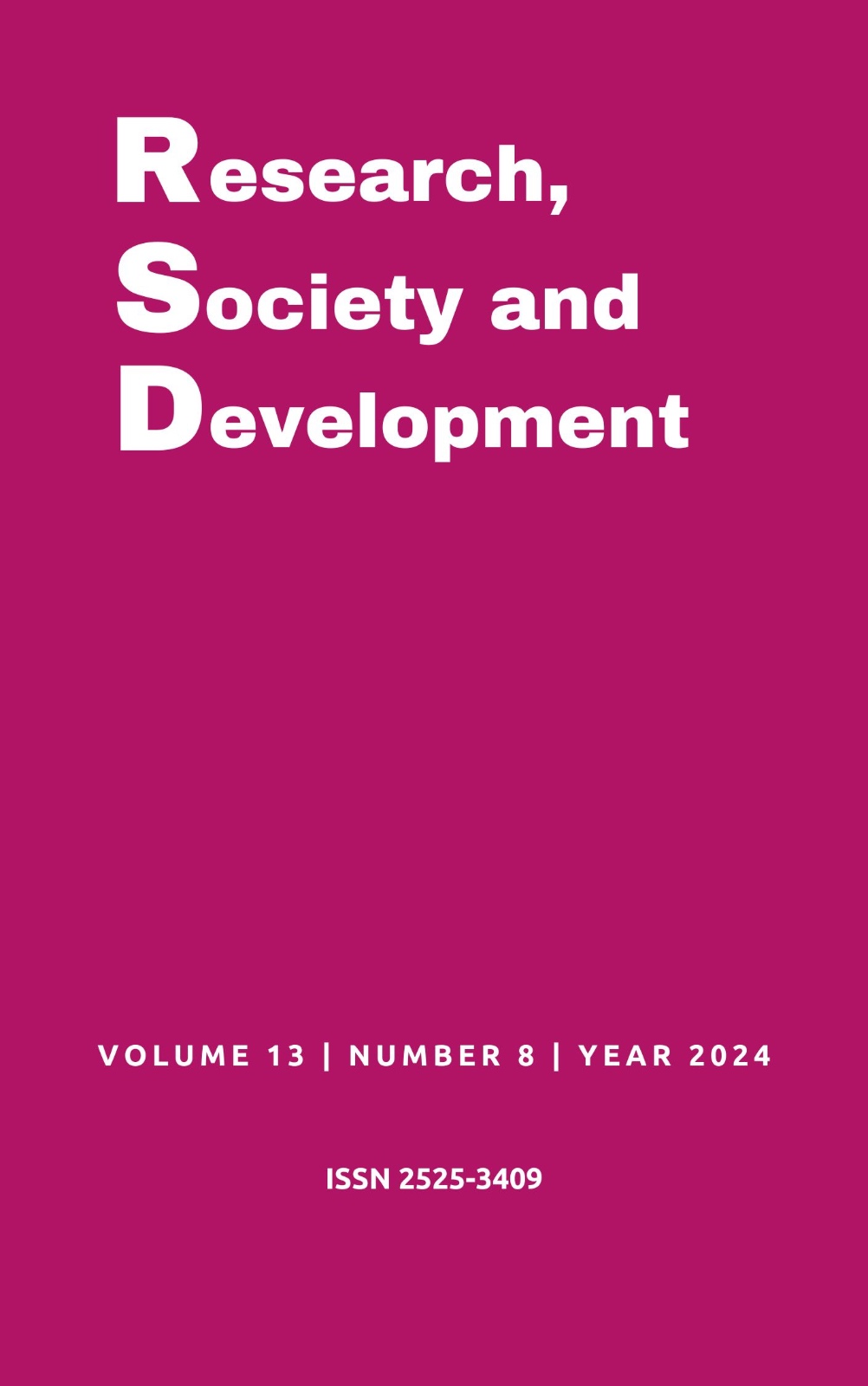Distanásia e ortotanásia: Reflexões éticas, legais e sociais na prática médica contemporânea
DOI:
https://doi.org/10.33448/rsd-v13i8.46604Palavras-chave:
Direito a morrer, Ética médica, Normas de prática médica, Normas jurídicas, Paternalismo.Resumo
A eutanásia, embora ilegal no Brasil, é amplamente discutida no âmbito jurídico. Em contraste, a ortotanásia, morte sem sofrimento e no tempo certo, e distanásia, morte com prolongamento de vida e penosa, são pouco debatidas e não esclarecidas na legislação. Esta falta de discussão influencia a tomada de decisões no legislativo baseadas em interesses pessoais ou corporativos, negligenciando a dignidade humana. Destaca-se a importância de respeitar a autonomia do paciente para garantir uma morte digna e criminalizar a distanásia. O objetivo do presente artigo é apresentar uma revisão narrativa de literatura sobre a distanásia e ortotanásia, utilizando as bases BVS e SciELO. Além de uma análise crítica da obra “Ensaios em Bioética” de Rui Nunes. Foram selecionados 18 artigos relevantes, além de análises da Constituição, Código de Ética Médica e Código Penal, para uma compreensão abrangente dos aspectos legais, sociais e éticos. As tecnologias que permitem o prolongamento artificialmente a vida dos pacientes influenciam a prática de distanásia, condenada pelo Código de Ética Médica brasileiro. A prevenção quartenária visa proteger pacientes de intervenções excessivas. No entanto, a legislação brasileira sobre a finitude da vida é escassa e confusa, levando à marginalização da ortotanásia e a prática da distanásia pelos médicos. Projetos de lei frequentemente não diferenciam eutanásia e distanásia, sendo influenciados por dogmas morais e religiosos que desconsideram a dignidade do paciente. A ampliação do debate da morte e a criação de uma legislação clara garantirão a autonomia do paciente essencial para garantir uma morte digna com ortotanásia e evitar a distanásia.
Referências
Barbosa, G., & Losurdo, F. (2018). Eutanásia no Brasil: entre o Código Penal e a dignidade da pessoa humana. Revista de Investigações Constitucionais, 5(2), 165-186. https://doi.org/10.5380/rinc.v5i2.52151. https://www.scielo.br/j/rinc/a/MKcqnSGvQrkG3z5HSHRkLhF/
Borges, S. A. R. P., Bastos, A. T. & Souza, L. P. (2018). Eutanásia no Projeto de Código Penal: Reflexões sobre o direito à vida e a autonomia da vontade na perspectiva constitucional. Unisanta Law and Social Science. 7, 140-164.
Berlinguer, G. (2004). Bioética Quotidiana (280 p.). Editora UnB.
Conselho Federal de Medicina (CFM). (2014). Os limites da vida e as limitações da Justiça do Brasil. Brasília. https://portal.cfm.org.br/index.php?option=com_content&view=article&id=24947:os-limites-davida-e-as-limitacoes-da-justica-do-brasil&catid=46:artigos&Itemid=18.
Conselho Federal de Medicina (2019). Código de Ética Médica (2018, modificada pelas Resoluções CFM nº 2.222/2018 e 2.226/2019). https://portal.cfm.org.br/images/PDF/cem2019.pdf.
Constituição da República Federativa do Brasil, (1988). Brasília, DF: (Senado Federal).
Dantas, J. B., Borges, J. E., & Dutra, A. B. (2021). Entre a morte e a experiência da finitude: histórias e diálogos com o contemporâneo. Rev. Nufen: Phenom. Interd 13(1),41-55. http://pepsic.bvsalud.org/pdf/rnufen/v13n1/v13n1a04.pdf
Eich, M., Verdi, M. I. M., Finkler, M., & Martins, P. P. S. (2023). Eutanásia Voluntária Ativa, Suicídio Assistido, Ortotanásia e os Cuidados Paliativos: um panorama das discussões no Poder Legislativo Federal Brasileiro. Rev Bio y Der, 59, 97-115. 10.1344/rbd2023.59.39640. https://www.researchgate.net/publication/374919365_Eutanasia_Voluntaria_Ativa_Suicidio_Assistido_Ortotanasia_e_os_Cuidados_Paliativos_um_panorama_das_discussoes_no_Poder_Legislativo_Federal_Brasileiro.
Eich, M., Verdi, M. I. M., Finkler, M., & Martins, P. P. S. (2024). Práticas de Fim de Vida: Análise bioética dos projetos do Poder Legislativo brasileiro, 1981-2020. Saude soc, 33 (2) https://doi.org/10.1590/S0104-12902024220871pt . https://www.scielosp.org/article/sausoc/2024.v33n2/e220871pt/
Felix, Z. C., da Costa, S. F. G., Alves, A. M. P. M., Andrade, C. G., Duarte, M. C. S., & Brito, F. M. (2013) Eutanásia, distanásia e ortotanásia: revisão integrativa da literatura. Revista Bioética, 18(9) https://doi.org/10.1590/S1413-81232013000900029. https://www.scielo.br/j/csc/a/6RQCX8yZXWWfC6gd7Gmg7fx/.
Gracia, D. (2004) Pensar a bioética: Metas e desafios (568 p.). [place unknown]: Edições Loyola.
Grau, E. (2018). Juízes interpretam e aplicam a Constituição e as leis, não fazem justiça. O Estado de S. Paulo, São Paulo, SP. https://www.conjur.com.br/2018-mai-14/eros-grau-juizes-interpretam-aplicam-constituicao-nao-fazem-justica.
Gonzaga, A. A., Falleiros, L. A. & Labruna, F. (2024). Morte digna como direito: visibilidade jurídica da finitude. Revista Brasileira de Bioética. 32. https://doi.org/10.1590/1983-803420243629PT. https://revistabioetica.cfm.org.br/revista_bioetica/article/view/3629.
Heidegger, M. (2005) Ser e tempo. (15a ed.,162 p.). Vozes.
Ivankovics, I. G., Vieira, G. S. R., Faleiro, R. F., Vieira, T. F. M., Romanini, W. G. B., Nascimento, W. S., Júnior, C. R. H. M., Falqueti, A. B. & Nunes, R. (2023). Morte digna na Unidade de Terapia Intensiva: como ela tem sido conduzida?. Acta bioteth,, 29(2). http://dx.doi.org/10.4067/S1726-569X2023000200213. https://www.scielo.cl/scielo.php?script=sci_arttext&pid=S1726-569X2023000200213&lng=en&nrm=iso&tlng=en.
Menezes, R. A., & Ventura, M. (2013). Ortotanásia, sofrimento e dignidade Entre valores morais, medicina e direito. Rev. bras. Ci. Soc, 28(31), 1-18. https://doi.org/10.1590/S0102-69092013000100013 https://www.scielo.br/j/rbcsoc/a/KthhpN5JyP943XF7jQ8bMhc/.
Morais, I. M., Nunes, R., Cavalcanti, T. & Soares, A. K. S. (2016). Percepção da “morte digna” por estudantes e médicos. Revista Bioética, 1(24) 10.1590/1983-80422016241112. https://revistabioetica.cfm.org.br/revista_bioetica/article/view/1193.
Norman, A. R. & Tesser, C. D. (2009). Prevenção quaternária na atenção primária à saúde: uma necessidade do Sistema Único de Saúde. Cad. Saúde Pública, 25(9) https://www.scielosp.org/pdf/csp/2009.v25n9/2012-2020/pt.
Nunes, R. (2017). Ensaios em Bioética Brasília. (280 p.). CFM, https://www.scielosp.org/pdf/csp/2009.v25n9/2012-2020/pt
Lei n° 7.209, de 11 de julho de 1984. Dos crimes contra a vida (Código Penal). Brasília, DF: Presidência da República. https://www.planalto.gov.br/ccivil_03/decreto-lei/del2848compilado.htm
Silva, J. A. C., Souza, L. E. A., Silva, L. C. & Teixeira, R. K. C. (2014). Distanásia e Ortotanásia: práticas médicas sob a visão de um hospital particular. Revista Bioética, 22(2) https://doi.org/10.1590/1983-80422014222017. https://www.scielo.br/j/bioet/a/BW7LqWvzQBmbyQrvhFjn3WH/?lang=pt#
Downloads
Publicado
Edição
Seção
Licença
Copyright (c) 2024 Helena Freitas Brandão Godói Godinho; Maria Eduarda Mota de Pinho; Lúcio Aparecido Moreira

Este trabalho está licenciado sob uma licença Creative Commons Attribution 4.0 International License.
Autores que publicam nesta revista concordam com os seguintes termos:
1) Autores mantém os direitos autorais e concedem à revista o direito de primeira publicação, com o trabalho simultaneamente licenciado sob a Licença Creative Commons Attribution que permite o compartilhamento do trabalho com reconhecimento da autoria e publicação inicial nesta revista.
2) Autores têm autorização para assumir contratos adicionais separadamente, para distribuição não-exclusiva da versão do trabalho publicada nesta revista (ex.: publicar em repositório institucional ou como capítulo de livro), com reconhecimento de autoria e publicação inicial nesta revista.
3) Autores têm permissão e são estimulados a publicar e distribuir seu trabalho online (ex.: em repositórios institucionais ou na sua página pessoal) a qualquer ponto antes ou durante o processo editorial, já que isso pode gerar alterações produtivas, bem como aumentar o impacto e a citação do trabalho publicado.


